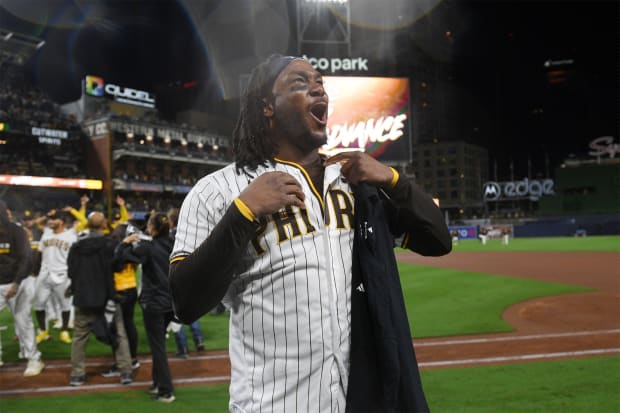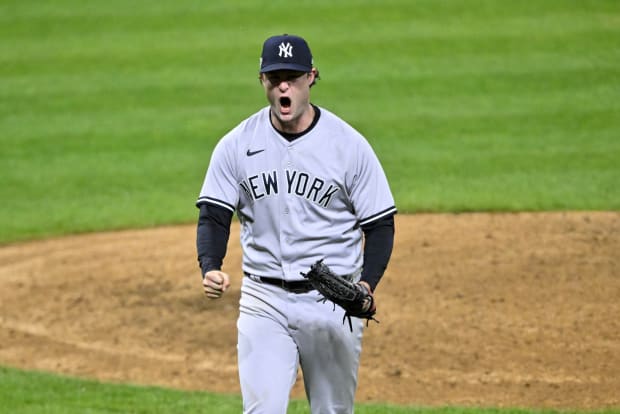There’s a scene in Martin Scorsese’s The Departed (2006) in which Captain George Ellerby (Alec Baldwin) is asking Colin Sullivan (Matt Damon) about Jimmy Pappas (Paris Karounos), who was arrested for the murder of two gangsters from Providence. Both of them know Pappas, a local Greek restaurateur, was framed for it.
Ellerby: What happened to Jimmy Pappas?
Sullivan: Jimmy had a rough month. Jimmy had a heart attack in jail and then he got himself knifed in Boston City Hospital. I believe it’s been in the papers.
Ellerby: You seem quite happy with that result?
Sullivan: It’s a f—ing result.
Ellerby: Yeah, but cui bono? Who benefits?
Sullivan: Cui gives a s---t? It’s got a freakin’ bow on it.
I thought about this scene over the weekend, as the new playoff format began to go through the take cycle. After the Dodgers and Braves, the top two National League teams, were both eliminated by the two lowest seeds after just four games, and one of the top two American League teams, the Yankees, fell behind, 2–1, in their best-of-five series, fans and media members began asking that same question that Ellerby asked Sullivan: Cui bono? The answer, at least for now, is also the same as it was in the movie, though with far less sinister consequences: It doesn’t really matter.

Orlando Ramirez/USA TODAY Sports
First, there were the questions we had months ago when the expanded postseason was first announced:
- Does it give an unfair advantage to the top two division winners?
- Does it give an unfair advantage to the teams playing all three of their games at home in the wild-card round?
Now, the questions are:
- Do the lower wild-card teams benefit because they were playing in high-stakes games over the last month just to get into the postseason and therefore entered October on a hot streak?
- Do the top two division winners who get first-round byes face an unfair disadvantage because of the long layoff between the end of the regular season and the start of the Division Series?
The best answer to these questions is: We have no way of knowing. Each of the upsets we’ve seen so far in the postseason can be attributed to specific circumstances that have nothing to do with long layoffs or home field advantage or the length of the series or any of the other conclusions we’ve reached prematurely.
Let’s not forget, upsets have been part of the MLB postseason for years. The Braves won the World Series last year after winning the fewest regular-season games (88) of any playoff team. The 93-win Nationals won the wild-card game, then defeated the 106-win Dodgers and 107-win Astros en route to their World Series title in 2019.
Since the first year that the postseason expanded to include wild-card teams in 1995 and not including the shortened 2020 season …
- There have been just three seasons in which the top team from each league also played in the World Series (1995, ’99, 2013).
- There have been two seasons in which two wild-card teams met in the Fall Classic (2002, ’14).
- Five of the World Series winners finished the regular season with at least 100 wins (1998, 2009, ’16, ’17, ’18).
- Four of the World Series winners won fewer than 90 games in the regular season (2000, ’06, ’14, ’21).
- The team with the best record in its league has won the World Series 10 times (1995, ’98, ’99, 2005, ’07, ’09, ’13, ’15, ’16, ’18).
- The team with the best record in MLB has won the World Series six times (1998, 2007, ’09, ’13, ’16, ’18).
- The team with the worst record among the playoff teams has won the World Series five times (2000, ’06, ’11, ’14, ’21).
- Seven wild-card teams have won the World Series (1997, 2002, ’03, ’04, ’11, ’14, ’19).
So yes, the best teams in each league don’t benefit from this new format, but they didn’t exactly benefit from any of the previous times the postseason expanded, either. That’s exactly the point. If we wanted the World Series to be a matchup between the best regular-season team from each league, we’d just go back to the system in place before 1969, when the World Series was the entire postseason. That seems a lot less fun than what we have now: an entire month of playoff baseball.
There is a completely valid question about whether this new format gives the top teams even less of an advantage than the previous wild-card systems did, but right now it’s way too soon to tell. Then again, if this does end up being the case, is that necessarily a bad thing?
Unpredictability is one of the things that makes the postseason great, even if fans of certain teams don’t like that their reward for regular-season dominance is an early postseason exit. Sports are far more exciting when the outcomes don’t feel predetermined.
So, regarding the expanded postseason: Cui bono? My answer: baseball fans.
1. THE OPENER

David Richard/USA TODAY Sports
“It’s sort of a shame that, for how well Gerrit Cole pitched in a must-win American League Division Series Game 4 that the Yankees won 4–2, the most memorable image will be of his one mistake.”
That’s Stephanie Apstein, writing in her column on Cole’s excellent performance last night against Cleveland. Cole pitched about as well as the Yankees could have hoped, and his efforts set up tonight’s winner-take-all Game 5 in the Bronx.
Gerrit Cole Lets His Second Gem Against the Guardians Do the Talking by Stephanie Apstein
Josh Naylor’s home run celebration may end up being the lasting image of Game 4, but Cole’s season-saving performance is what really matters.
2. ICYMI
Let’s get you caught up on some of our other great stories from over the weekend.
Padres Expose Dodgers’ Flaws in Stunning Series Win by Tom Verducci
As Los Angeles stuck to a script that got it in trouble, San Diego hardly looked like the underdog in defeating its division rival in the NLDS.
The Yankees Will Need a New Manager Next Season by Matt Martell
The aftermath of Aaron Boone’s decision not to use Clay Holmes in New York’s Game 3 loss, more than the decision itself, is why he is in his final days as the team’s manager.
The Mariners’ Marathon Loss Is More of a Beginning Than an End by Greg Bishop
Seattle’s first home MLB playoff game in 21 years brought together a city starved for baseball success—one that still has reason for hope despite the Mariners’ elimination.
‘It Feels Like Failure’: The Braves’ Promising Season Is Over by Emma Baccellieri
This team was better than the one that won the World Series last year. That’s what makes this early exit so painful.
3. WORTH NOTING from Matt Martell
One silver lining for the Guardians in last night’s loss is that they didn’t use any of their top three relievers: Emmanuel Clase, James Karinchak and Trevor Stephan. Expect manager Terry Francona to turn to the trio early, even if starter Aaron Civale pitches well.
Also, keep in mind that we could see a starter pitch tonight in relief. Aaron Boone said after last night’s game that Nestor Cortes Jr. will be in the bullpen tonight. Gerrit Cole told Boone he could pitch in relief tonight, but considering he threw 110 pitches in last night’s Game 3, Cole would probably be a last resort.
4. W2W4 from Matt Martell
Say it with me: Elimination game! After just one of four wild-card series reached win-or-go-home status, the same pattern has unfolded for the divisional round. The Yankees will turn to righthander Jameson Taillon for the decisive game, while the Guardians will go with righty Aaron Civale. This will mark the second time in five years that Cleveland and New York will meet in an ALDS Game 5. The Yankees won the first time, 5–2, at Progressive Field, but will have home field advantage this time around in front of what’s sure to be a charged-up Yankee Stadium crowd.
There is rain in the forecast tonight in the Bronx, so there is a chance the game (first pitch set for 7:07 p.m.) could be delayed or postponed until tomorrow. Stephanie Apstein and Matt Martell are at Yankee Stadium, so follow along with them on Twitter (@stephapstein, @ByMattMartell) for updates.
5. THE CLOSER from Emma Baccellieri
This will surely be a stressful week for A.J. and Stacie Nola—parents of Aaron (the Phillies pitcher) and Austin (the Padres catcher). As their sons face off in the NLCS, they’ll have to juggle rooting interests with familial affection. But this isn’t the first playoff matchup with a fraternal twist. Clete and Ken Boyer played against each other in the 1964 World Series, for the Yankees and Cardinals, respectively—and each of them homered in the later innings of Game 7. Ken’s home run extended the Cardinals’ lead in the seventh, while Clete’s tried to get a Yankees comeback going in the ninth. (St. Louis ultimately won, 7–5.) Compared to brothers in Game 7 of the World Series, this current situation doesn’t seem so tough, does it? But the Nolas do have the added component of having to potentially face each other when Aaron is on the mound and Austin is at the plate.







